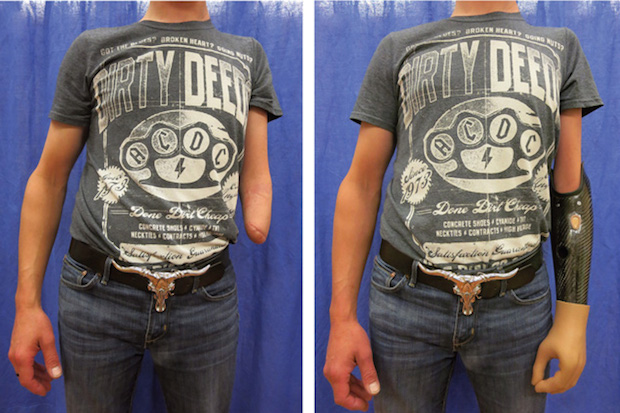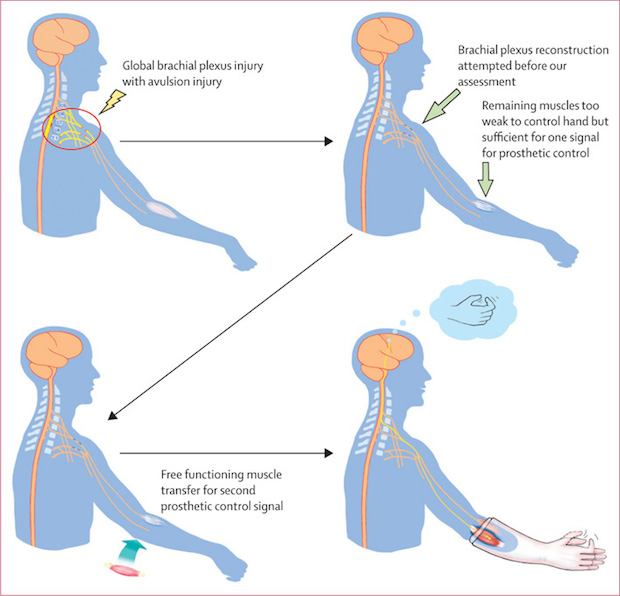Three men receive mind-controlled bionic hands
Three men have been equipped with bionic hands which they control with their minds, allowing them to rediscover everyday tasks like picking up a ball or pouring water from a jug.
The Austrian men between 26 and 32, who had lost the use of either their left or right hand after motor vehicle and rock climbing accidents, had tried traditional efforts to reconstruct the injured hand with little success. So, they turned to Oskar Aszmann, director of the Christian Doppler Laboratory for Restoration of Extremity Function at the Medical University of Vienna.
In a Lancet study released Wednesday, Aszmann and his colleagues said the procedure combines the transfer of nerve and muscle, amputation of the injured hand and replacement with an advanced robotic prosthesis. The new hand uses sensors that respond to electric impulses in the muscles.
"The innovation here is not the bionic hand itself but the surgical technique and the rehabilitation afterwards," Aidan D. Roche, one of the co-authors on the paper, said.
The study subjects all had what are called brachial plexus injuries, in which the nerves of the brachial plexus - the network of nerves that originate in the neck region and branch off to control movement and sensation in the shoulder, arm, forearm and hand - are damaged.
Brachial plexus injuries often occur as a result of trauma from high speed collisions, especially in motorcycle accidents, and in collision sports such as rugby and football.
"In effect, brachial plexus avulsion injuries represent an inner amputation, irreversibly separating the hand from neural control," Aszmann said. "Existing surgical techniques for such injuries are crude and ineffective and result in poor hand function."
"The scientific advance here was that we were able to create and extract new neural signals via nerve transfers amplified by muscle transplantation," he continued.
As shown in the illustration below, injuries can leave muscles somewhat functioning, but not strong enough to control a prosthesis. The men underwent amputation of the injured hands, and Aszmann transplanted healthy muscle from their legs and routed nerves to send signals for controlling the bionic hand.
The researchers describe the approach as groundbreaking in that it involves the transplantation of muscle to an amputation site, giving them fresh nerve endings to control the movement of a prothesis, Roche said. In the past, successful procedures enabling a patient to control a prothesis via thought were done with amputees whose nerve endings weren't damaged.
"This opens the door for treating other types of injuries," Roche said, adding that they are already working with other patients who have suffered both hand and forearm injuries. "Imagine an industrial worker who has put his hand into a machine and a conveyor belt ripped off the flesh and destroyed the bones."
The procedure shows the progress being made in bionic limbs at a time when their demand keeps growing - partly due to combat injuries suffered in Iraq and Afghanistan. Just in the United States, the American Occupational Therapy Association said that about 1.7 million Americans live with limb loss an estimated 1 in 200 have had an amputation.
Prof. Simon Kay, who carried out the UK's first hand transplant, and Daniel Wilks from Leeds Teaching Hospitals NHS Trust, praised the new technique as promising in a comment that accompanied the study.
"The present findings - and others - are encouraging, because this approach provides additional neural inputs into prosthetic systems that otherwise would not exist," they wrote.
"However, the final verdict will depend on long-term outcomes, which should include assessment of in what circumstances and for what proportion of their day patients wear and use their prostheses," they said. "Compliance declines with time for all prostheses, and motorized prostheses are heavy, need power, and are often noisy, as well as demanding skilled repair when damaged."
But so far so good, according to Markus Kemeter, one of the three men who received the bionic hand. "It is quite easy to operate the hand and I'd do it again if I had to," Kemeter told CBS News. "There have been no problems."
Aszmann said he was optimistic that the procedure could spread and that it was part of a trend in which approaches "unthinkable only a few years ago" could become the norm.

